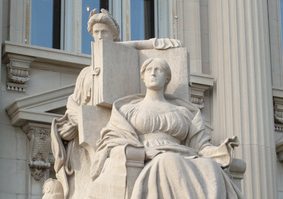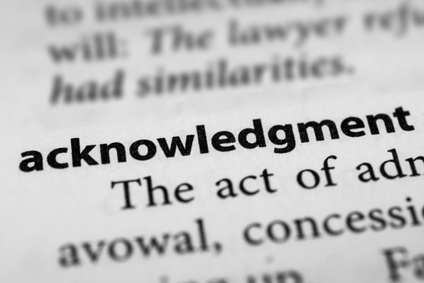The U.S. Court of Appeals for the Seventh Circuit recently held that a bank’s lawsuit against the husband of a debtor who had filed for bankruptcy did not violate the co-debtor stay because the husband’s credit card debts were not a consumer debt for which the debtor was personally liable. A copy of the opinion in Smith v. Capital One Bank (USA), NA is available at: Link to Opinion. A debtor filed for bankruptcy in 2011. During the course of the bankruptcy proceedings, a bank filed suit and obtained a judgment against the debtor’s husband on a credit card debt…
Posts published by “Maurice Wutscher LLP”
The attorneys of Maurice Wutscher are seasoned business lawyers with substantial experience in business law, financial services litigation and regulatory compliance. They represent consumer and commercial financial services companies, including depository and non-depository mortgage lenders and servicers, as well as mortgage loan investors, financial asset buyers and sellers, loss mitigation companies, third-party debt collectors, and other financial services providers. They have defended scores of putative class actions, have substantial experience in federal appellate court litigation and bring substantial trial and complex bankruptcy experience. They are leaders and influencers in their highly specialized area of law. They serve in leadership positions in industry associations and regularly publish and speak before national audiences.
The Supreme Court of the State of Illinois recently affirmed the dismissal of a borrower’s claims for intentional and negligent infliction of emotional distress against her mortgagee, property inspection and preservation company and its local subcontractors, who entered the home after the borrower’s default to secure the property. In so ruling, the Court held that: (a) a direct victim’s claim for emotional distress must include an allegation of contemporaneous physical injury or impact that caused emotional distress, or that she was a bystander in a zone of physical danger that caused her to fear for her own safety and that…
The U.S. Court of Appeals for the First Circuit recently rejected a bankruptcy trustee’s effort to avoid a mortgage on the basis that the acknowledgment signed by the borrowers’ attorney-in-fact was defective under Massachusetts law, holding that the acknowledgment was not materially defective because as a matter of agency law the attorney-in-fact’s signature was the borrowers’ “free act and deed.” A copy of the opinion in HSBC Bank USA, N.A. v. Lassman is available at: Link to Opinion. The borrowers purchased a parcel of “registered land” in 1994 in North Attleboro, Mass. (the “subject property”). “Registered land” is real property…
The United States District Court for the Middle District of Pennsylvania recently determined that the sole issue for trial was whether the consumer should be awarded treble damages in his complaint alleging a violation of the Telephone Consumer Protection Act because “a plaintiff need not answer or hear a call to prove prohibited conduct under the TCPA, but need only prove the act of placing the call itself.” A copy of the opinion in Manuel v. NRA Group, LLC is available at: Link to Opinion. The consumer alleged that the issue of statutory damages was resolved by the Court during…
The U.S. District Court for the District of New Jersey recently ruled that 18 telephone calls to a consumer over a two-week period – of which 17 were unanswered, and the last where the consumer hung up – did not violate the federal Fair Debt Collection Practices Act (FDCPA). In so ruling, the Court also affirmed that under the federal Telephone Consumer Protection Act (TCPA), persons who knowingly release their phone numbers have in effect given their invitation or permission to be called at the number which they have given, absent instructions to the contrary. A copy of the opinion…
The District Court of Appeal of Florida, Fifth District, recently ruled that a specific denial that a mortgagee complied with HUD’s pre-foreclosure regulations that were incorporated into the mortgage was a denial of a condition precedent to foreclosure that shifted the burden to the mortgagee to prove compliance.
The District Court of Appeal of Florida, Second District, recently rejected a borrower’s objection to a foreclosure sale under the theory the mortgagee failed to provide him with an “estoppel letter,” which would have allowed him to exercise his right of redemption. A copy of the opinion is available at: Link to Opinion. A foreclosure judgement was entered and the property was sold via public sale. Ten days later, the borrower objected to the sale of the property. The objection was denied and a certificate of title was issued to the mortgagee. The borrower appealed, arguing that the trial court…
The Third District Court of Appeal of the State of Florida recently affirmed a final judgment awarding attorney’s fees to the borrowers in a mortgage foreclosure action, even though the borrowers failed to raise any request for attorney’s fees in their answer and affirmative defenses to the foreclosure complaint. In so ruling, the Court held that the mortgagee was on notice that the borrowers were seeking to recover their attorney’s fees and failed to timely object to the borrowers’ failure to plead entitlement. A copy of the opinion is available at: Link to Opinion. The mortgagee filed a mortgage foreclosure…
The U.S. Court of Appeals for the Seventh Circuit recently held that a bank that honored a counterfeit check was not entitled to reimbursement from the party who deposited the check, nor from the depositing party’s bank or the Federal Reserve. A copy of the opinion is available at: Link to Opinion. In 2013, an attorney received an email from a person who claimed she wanted to hire him to help her recover money that she said she was owed in a divorce proceeding. The purported ex-wife subsequently told the attorney that after retaining him, her ex-husband settled, and that…
The U.S. Court of Appeals for the Eleventh Circuit recently held that federal courts that have original subject matter jurisdiction over state law claims under the federal Class Action Fairness Act retain that jurisdiction even when the class claims are dismissed before the class is certified.
The U.S. Court of Appeals for the Second Circuit recently held in a non-precedential opinion that a consumer, in the circumstances of this case, did not have standing to bring putative class action claims after entry of judgment in his favor on his individual claims pursuant to the defendants’ offer of judgment under Rule 68 of the Federal Rules of Civil Procedure.
The District Court of Appeal of the State of Florida, Fourth District, recently reversed a trial court’s ruling in favor of mortgage loan borrowers based on the mortgagee’s failure to satisfy a condition precedent in paragraph 22 of the mortgage in accepting partial payments after default, holding that the mortgagee substantially complied with the requirements of the mortgage. In so ruling, the Court held that the mortgagee was not obligated to send new acceleration notices after each partial payment was received, as the borrowers never cured the default by paying the total amount needed to cure the default and reinstate…












